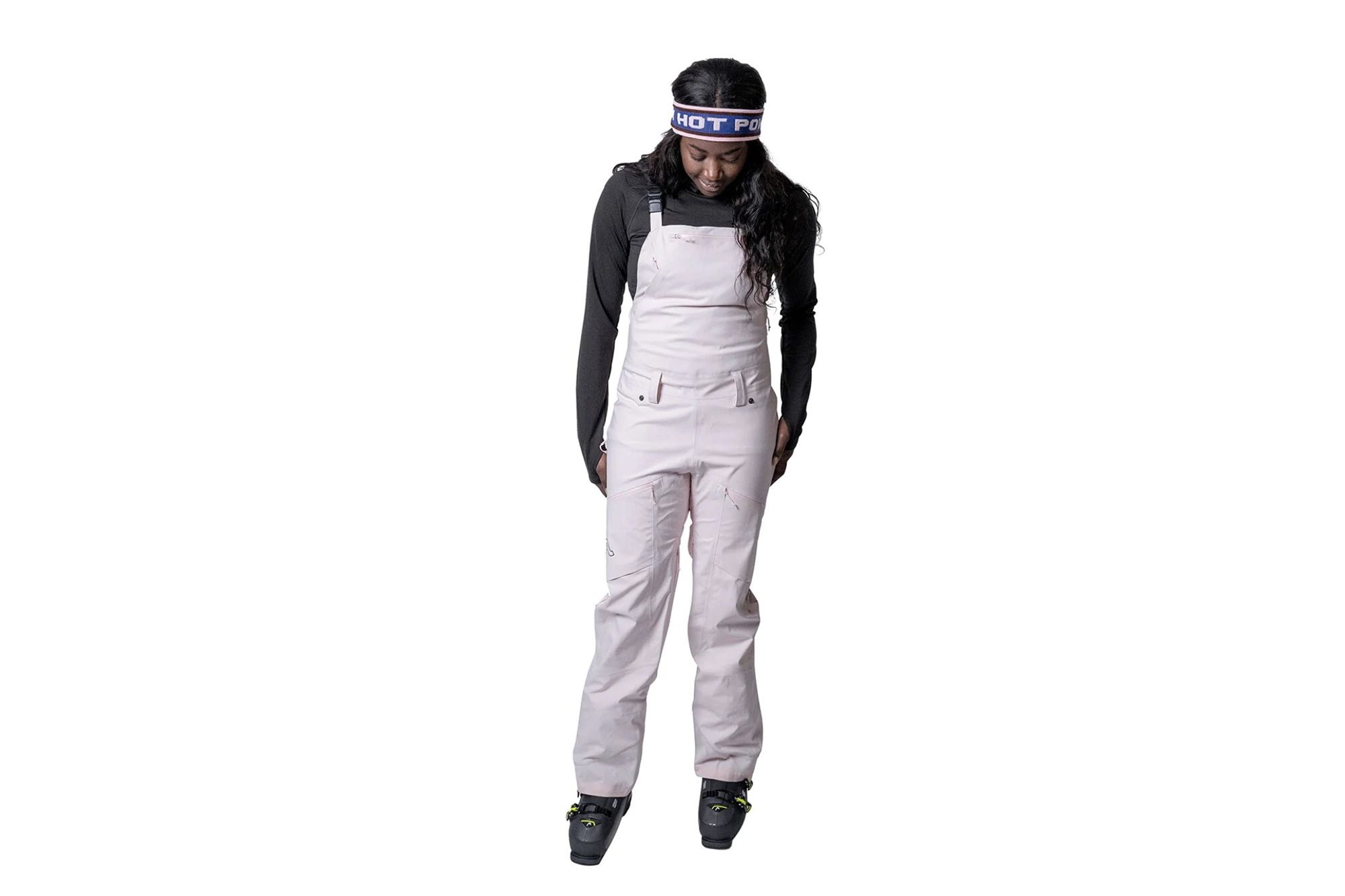
Ski pants are an essential piece of winter gear. These pants must be capable of keeping you warm and dry even in the harshest weather conditions. When purchasing new winter gear, most people will put their gear first.
The Best Lightweight ski pants
A good pair cold weather ski pants should not be too heavy or too hot to be worn over any base layer. They should be waterproof and breathable to be suitable for all weather conditions.
Non Bulky Snow Pants
Uninsulated ski pants are the most comfortable. They are made of a waterproof shell and have a thin lining. These are a popular choice for those who prefer to stay warm but want a lighter weight and a lower profile than the insulated options.
These pants are often called "softshell" or "softshell bibs" and are ideal for both resort and backcountry use. These pants are lined with thin, breathable fleece or mesh and have a waterproof outer shell.

Flylow Intuitive trousers are lightweight and breathable ski pants. These pants are waterproof to 10k and have 40g of synthetic insulation. They also have four vents which help you keep warm when it gets too hot.
Another good option for those looking for a lightweight snow pant is the Perfect Moment Aurora Flare pants. These pants are relaxed in fit and feature kneepads, inner sleeves to keep snow out and a thermal fleece lining to keep you warm.
They are also available in a wide range of sizes to fit all body types and ages. You can remove your outer layer with ease by removing the zipper at your legs.
Alternatively, you can find a pair of ski pants that are fully taped for added protection. This will keep water and moisture out of the seams. It's a useful feature for skiers who may be skiing in heavy or damp conditions.
Pants for Thin and Warm Skiing
These snow pants are very popular. They are made from a waterproof outer shell with taffeta and other soft fabrics that provide warmth for your legs, while still keeping you dry.

Ski pants that are adjustable in the waist should be your top choice. This will allow you to adjust the fit according to your height. This is especially useful for petite or tall skiers.
An excellent pair of ski pants with insulation should have a soft, taffeta liner. Thigh vents allow heat to escape when it gets too cold. These features are crucial for anyone who spends long periods in the backcountry. The temperatures can drop to minus 40 degrees F.
FAQ
What size luggage should I carry?
The amount of luggage you take depends on the length of your trip. If you are traveling by plane, you only need hand baggage, usually less than 20kg. For a bus or train ride, however, you will require more space.
A form will be provided to you when you arrive at the airport with information about your flight. This will include information such as the weight of your bags and whether you require assistance when checking them in.
This must be done before you leave your home. If you don’t check it, you might end up waiting hours for everyone else to do so.
It's best to travel light, as you never know when something might happen. If your bag is lost or damaged, you will not have any clothes.
Do I need travel insurance?
Travel insurance is essential for anyone who plans to go on an adventure. It is important to have insurance that covers all types of adventure sports.
If you're skiing, for example, it is important to have medical coverage. You should also think about getting coverage for theft loss and damage.
Also, you should consider purchasing cancellation insurance. You can cancel your holiday without incurring any penalty.
In addition, you should ask for cover for emergency evacuation. This includes evacuation from the mountain in the case of an earthquake or other natural disaster.
What documents should I keep handy when traveling?
To make it easy to find important documents on the road, keep copies at home. Keep a backup of your passport and driver's licence, as well as any credit card information, if you intend to use an ATM.
It is a good idea if you have a photocopy your passport so that it can be used in the event of a need.
Include copies of your reservation and itinerary. These will help with your planning and remembering where you are.
Also, keep a duplicate of your flight ticket as well as details about your hotel reservation. You will be able to reach someone back home if there is any trouble.
Also, don't leave valuables unattended. Make sure you have a place to store your valuables, such as a money belt or in your luggage.
Check your bag before you go to prevent losing expensive items.
Keep in mind: It is safer to keep it simple than to plan everything.
So just relax and enjoy your journey!
How do I prepare for vacation?
You need to eat and exercise regularly to maintain a healthy lifestyle while on vacation.
You should also ensure you are well rested and hydrated before leaving home.
All necessary travel documents should be prepared.
You should also ensure that you have enough medicine to last you through your trip if you plan to take any medication.
Finally, be sure to pack a change of clothes in case you get sick or injured.
Where can I store my luggage safely?
There are many options. The most common one is to use lockers at airports. These lockers are located in the vicinity of the security area. They can be purchased for between $5-10 per daily, depending upon the size of the locker.
Another option is to rent a storage unit. They are usually located outside of large shopping malls or hotels. Some places offer discounts if multiple units are rented together. Prices can vary.
Third, you can hire a porter. A porter will transport your luggage from the carousel into your room. You pay a small fee each time he helps you.
Are you concerned about what you might lose when you travel?
Yes, I often forget stuff. This is more common when I go on a short trip. Fortunately, I always bring everything I need, so I don't run out.
For example, I always have my passport with me. And I always check whether I have enough money when I buy tickets.
My phone charger is always with me. To store any other items, I keep them in a small bag.
How can you travel light?
There are no right or wrong answers when packing for a vacation. These tips will help guide you in choosing what to bring on your trip.
-
Only take what you actually need.
-
You should only pack what you actually wear.
-
Avoid buying too many things.
-
Take enough room in your suitcase
-
Always double-check to make sure that everything is in your bag.
-
Take advantage of free storage facilities.
-
Reusable water bottles are better than bottled water.
-
Use a backpack to carry your stuff instead of a bag.
-
If possible, take public transport and walk or cycle instead.
-
The right size bag is important.
-
Avoid carrying heavy items.
-
Be prepared for all eventualities
-
Do not leave anything behind
Statistics
- That's an 18% jump from 2019, the previous record year. (travelandleisure.com)
- No Checked Bags: No Alcoholic beverages with more than 70% alcohol (over 140 proof), including grain alcohol and 151 proof rum. (tsa.gov)
- You can use compression sacs or cubes to reduce the volume of your clothes by up to 80%—this is especially convenient for bulky items such as sweaters and jackets. (eaglecreek.com)
- Alcoholic beverages with 24% alcohol or less are not subject to limitations in checked bags. (tsa.gov)
- Pack sweaters, jackets, and underwear in reusable compression bags creating up to 75% more space in your luggage. (wikihow.com)
External Links
How To
What are your top travel tips?
You can travel is an exciting adventure, but there's a lot you need to be aware of to make sure you have a safe and enjoyable journey.
Here are some basic tips to help you plan your next vacation.
-
It is best to book early. Book early to get lower prices. By booking in advance, you can save money on hotels and flights.
-
Stay-at-budget accommodations. Hotels at a lower price offer more value. They are usually close to public transport and shopping centers.
-
Don't overpack. Don't overpack. Make sure you have enough space for souvenirs and other gifts. Make sure you bring clothes that fit well and don’t wrinkle easily.
-
Use common sense. If you're traveling alone, don't walk around late at night. Avoid sketchy neighborhoods and areas where crime is high.
-
Take precautions against theft. Keep valuables locked away from sight. Never leave anything valuable unattended when you go swimming.
-
Take care with your cash. Tourists living in foreign cities are often the target of thieves. Keep your money away from prying eyes and only use ATMs at banks or protected facilities.
-
Know what you're doing. Before booking a hotel, ensure you know how to get around using public transport. You can find out more about popular attractions, restaurants, or other sights.
-
Learn about safety. Learn about the culture, customs, laws and traditions of the area before you arrive.
-
Have fun! Enjoy the ride, no matter what. It's well worth it.